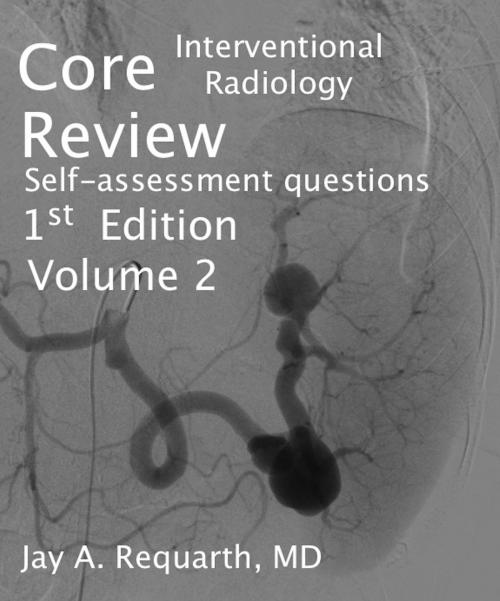Core Interventional Radiology Review
Self Assessment Questions Volume 2
Nonfiction, Health & Well Being, Medical, Specialties, Radiology & Nuclear Medicine| Author: | Jay A. Requarth | ISBN: | 9781483548715 |
| Publisher: | BookBaby | Publication: | January 10, 2015 |
| Imprint: | Language: | English |
| Author: | Jay A. Requarth |
| ISBN: | 9781483548715 |
| Publisher: | BookBaby |
| Publication: | January 10, 2015 |
| Imprint: | |
| Language: | English |
With the introduction of the new American Board of Radiology (ABR) Core Exam (a 13.5-hour, 2-day marathon) after the 3rd year of radiology residency, many residents are not receiving adequate interventional radiology (IR) exposure prior to the exam. The results of the recent Core Exam reflect this as IR again ranked lowest in mean national scores across all imaging modalities, similar to 2013. We decided that innovative teaching methods must be employed to improve radiology resident’s performance on the IR section of the ABR initial qualifying exam. This self-assessment book, which is a compilation of the weekly e-mail questions that we send to our residents, covers a broad range of interventional radiology topics; however, this book is not a complete review of the field of interventional radiology. Our goal is to help you identify areas where your knowledge is lacking so that you can spend your study time wisely. These self-assessment questions are designed to illustrate the clinical aspects of interventional radiology emphasizing the indications for, options to, and complications of interventional radiology procedures. Other than the some very basic technical information, the technical details of interventional radiology procedures will remain the domain of interventional radiology texts, as that material is unlikely to be on the ABR Core Exam. Core Interventional Radiology Review: Self-assessment questions, 1st Edition, is divided into 2 volumes so that the content can be conveyed as an e-book. Each volume contains more than 100 images or diagrams in over 200 pages to aide the resident’s grasp of interventional radiology concepts – thus the large data file size. Volume I contains the chapters entitled “The Basics” and “Arteries”. “The Basics” chapter covers information on consents, billing, pre-procedural evaluation, drugs, blood transfusions, interventional radiology equipment, fluoroscopy and radiation, clinical emergencies, and miscellaneous topics. The “Arteries” chapter has basic and aberrant arterial anatomy with numerous annotated images, information on peripheral vascular occlusive disease, treatment of vascular trauma and other causes of arterial bleeding, interventional oncology, and arterial diseases including thromboembolism. Volume II contains the chapters entitled “Veins”, “Abdomen and Pelvis”, “Thorax”, “Kidney, Ureter, and Bladder”, and “Miscellaneous Topics”. The “Vein” chapter contains information on the anatomy of important veins including the portal venous system, arteriovenous fistulas and grafts, TIPS, DVT, venous thromboembolism, and IVC filters. The “Abdomen and Pelvis” chapter has information on percutaneous feeding catheters, gallbladder and liver disease, percutaneous interventional oncology, abscesses and enteric fistulas, and treatment options for ascites. The “Thorax” chapter includes information on percutaneous lung biopsies and ablations and the treatment of pleural space problems. The “Kidney, Ureter, and Bladder” chapter has content on hydronephrosis, ureteral occlusions and perforations, and miscellaneous renal topics. The last chapter, “Miscellaneous Topics”, has content on image-guided pain procedures, cementoplasty, and lymphangiograms. Any monies generated from this book will be used to fund the MyCareLibrary.com website. This free website has information about image-guided palliative care procedures for both physicians and patients. The website can be viewed as webpages or downloaded in a PDF format. Many of our questions use content, hyperlinks, and images/diagrams from this website. The MyCareLibrary.com website is written to fulfill the palliative medicine needs of interventional radiology.
With the introduction of the new American Board of Radiology (ABR) Core Exam (a 13.5-hour, 2-day marathon) after the 3rd year of radiology residency, many residents are not receiving adequate interventional radiology (IR) exposure prior to the exam. The results of the recent Core Exam reflect this as IR again ranked lowest in mean national scores across all imaging modalities, similar to 2013. We decided that innovative teaching methods must be employed to improve radiology resident’s performance on the IR section of the ABR initial qualifying exam. This self-assessment book, which is a compilation of the weekly e-mail questions that we send to our residents, covers a broad range of interventional radiology topics; however, this book is not a complete review of the field of interventional radiology. Our goal is to help you identify areas where your knowledge is lacking so that you can spend your study time wisely. These self-assessment questions are designed to illustrate the clinical aspects of interventional radiology emphasizing the indications for, options to, and complications of interventional radiology procedures. Other than the some very basic technical information, the technical details of interventional radiology procedures will remain the domain of interventional radiology texts, as that material is unlikely to be on the ABR Core Exam. Core Interventional Radiology Review: Self-assessment questions, 1st Edition, is divided into 2 volumes so that the content can be conveyed as an e-book. Each volume contains more than 100 images or diagrams in over 200 pages to aide the resident’s grasp of interventional radiology concepts – thus the large data file size. Volume I contains the chapters entitled “The Basics” and “Arteries”. “The Basics” chapter covers information on consents, billing, pre-procedural evaluation, drugs, blood transfusions, interventional radiology equipment, fluoroscopy and radiation, clinical emergencies, and miscellaneous topics. The “Arteries” chapter has basic and aberrant arterial anatomy with numerous annotated images, information on peripheral vascular occlusive disease, treatment of vascular trauma and other causes of arterial bleeding, interventional oncology, and arterial diseases including thromboembolism. Volume II contains the chapters entitled “Veins”, “Abdomen and Pelvis”, “Thorax”, “Kidney, Ureter, and Bladder”, and “Miscellaneous Topics”. The “Vein” chapter contains information on the anatomy of important veins including the portal venous system, arteriovenous fistulas and grafts, TIPS, DVT, venous thromboembolism, and IVC filters. The “Abdomen and Pelvis” chapter has information on percutaneous feeding catheters, gallbladder and liver disease, percutaneous interventional oncology, abscesses and enteric fistulas, and treatment options for ascites. The “Thorax” chapter includes information on percutaneous lung biopsies and ablations and the treatment of pleural space problems. The “Kidney, Ureter, and Bladder” chapter has content on hydronephrosis, ureteral occlusions and perforations, and miscellaneous renal topics. The last chapter, “Miscellaneous Topics”, has content on image-guided pain procedures, cementoplasty, and lymphangiograms. Any monies generated from this book will be used to fund the MyCareLibrary.com website. This free website has information about image-guided palliative care procedures for both physicians and patients. The website can be viewed as webpages or downloaded in a PDF format. Many of our questions use content, hyperlinks, and images/diagrams from this website. The MyCareLibrary.com website is written to fulfill the palliative medicine needs of interventional radiology.















